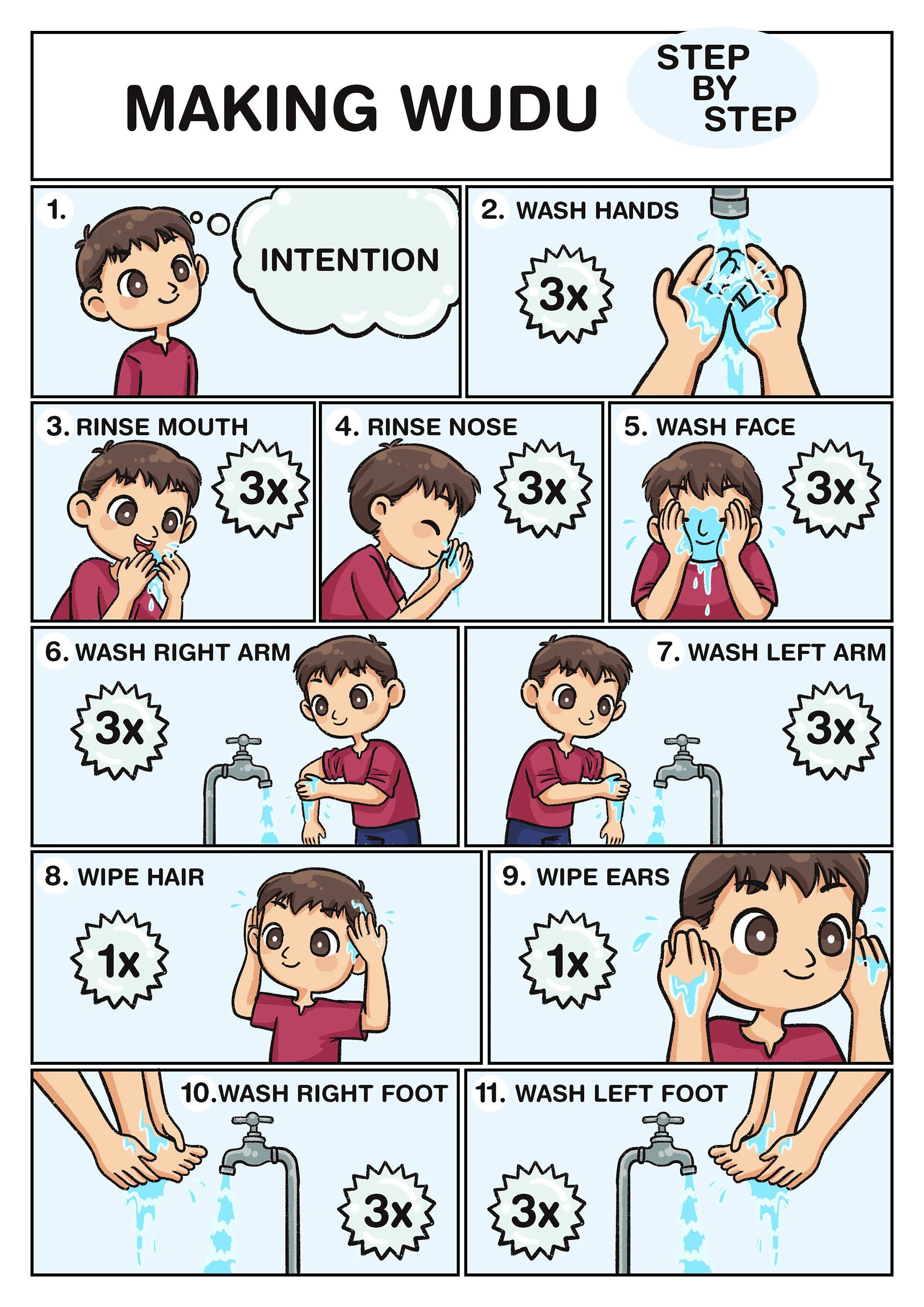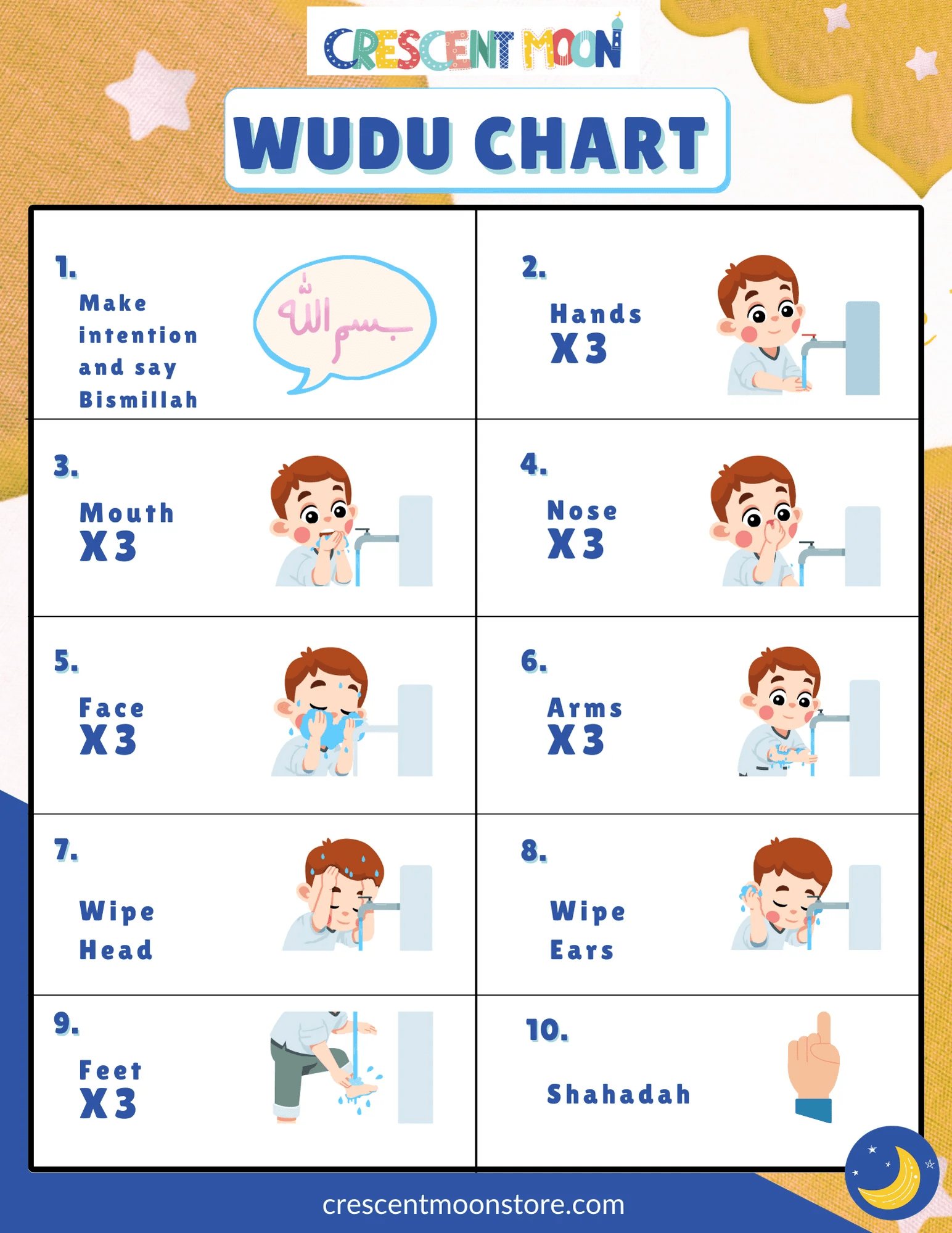What are the steps involved in performing wudu?
Wudu is the Islamic ritual of washing oneself before prayer. It is a mandatory requirement for all Muslims before they can offer their prayers. The steps of wudu are as follows:
1. Make the intention to perform wudu.2. Wash your hands up to the wrists three times.3. Rinse your mouth three times, making sure to swish the water around your mouth.4. Sniff water into your nose three times and blow it out.5. Wash your face three times, from the hairline to the chin and from ear to ear.6. Wash your right arm three times, from the fingertips to the elbow.7. Wash your left arm three times, from the fingertips to the elbow.8. Wipe your head once with wet hands, from the forehead to the back of the head.9. Wipe the inside of your ears with your wet fingers.10. Wash your feet three times, up to the ankles.
Wudu is an important part of the Islamic faith. It is a way to purify oneself before prayer and to connect with God. Muslims believe that wudu helps them to focus their minds and hearts on prayer.
Wudu Steps
Wudu, the Islamic ritual purification before prayer, consists of several essential steps:
- Intention
- Washing
- Rinsing
- Wiping
- Drying
- Obligatory
- Sunnah
- Invalidators
Intention is the first and most important step, as it sets the purpose for performing wudu. Washing involves the thorough cleansing of specific body parts, including the hands, face, arms, and feet. Rinsing ensures the removal of any impurities from the mouth and nose. Wiping involves passing wet hands over the head and the inner ears. Drying completes the process by removing excess water from the body.Wudu is obligatory for all Muslims before performing the five daily prayers. It is also considered sunnah, or recommended, to perform wudu before other religious acts, such as reading the Quran or entering the mosque. There are certain actions that can invalidate wudu, such as passing gas, urinating, or touching a member of the opposite sex.Understanding and correctly performing wudu is essential for Muslims to ensure the validity of their prayers and to maintain a state of purity during worship.
1. Intention
In the context of wudu, intention plays a pivotal role as the cornerstone of this ritual purification. It serves as the driving force behind the actions performed during wudu, setting the purpose and directing the worshipper's focus towards fulfilling the religious obligation.
The intention, known as niyyah in Arabic, must be present at the commencement of wudu. It involves the conscious decision to purify oneself for the purpose of prayer or other acts of worship. Without the proper intention, the wudu is considered invalid, as it lacks the essential element of sincerity and devotion.
The significance of intention in wudu extends beyond mere compliance with religious requirements. It fosters a deeper connection between the worshipper and the act of purification. When performed with the right intention, wudu becomes a means of spiritual renewal and preparation for communion with God. It signifies the worshipper's willingness to cleanse not only their physical body but also their heart and mind, creating a state of readiness for worship.
In practical terms, forming the intention for wudu is straightforward. As one begins the ritual, they should silently or verbally express their intention to purify themselves for the sake of Allah and to fulfill the obligation of wudu. This simple act sets the tone for the entire process, ensuring that the subsequent steps are performed with the necessary reverence and attention.
2. Washing
Washing is an essential component of wudu steps, the ritual purification process performed by Muslims before prayer. It involves the thorough cleansing of specific body parts with water, ensuring physical cleanliness and preparing the worshipper for spiritual connection.
- Washing the Hands and Forearms:
Washing the hands and forearms up to the elbows is the first step in wudu. It signifies purification from everyday activities and symbolizes the removal of impurities. Muslims are encouraged to wash their hands thoroughly, paying attention to the spaces between the fingers and the nails.
- Washing the Face:
Washing the face is the next step, involving the cleansing of the entire face from the hairline to the chin, and from ear to ear. It represents the purification of the senses and the preparation for focused worship.
- Washing the Arms:
After washing the face, the arms are washed from the fingertips to the elbows, with the inner and outer surfaces being cleansed. This action symbolizes the purification of deeds and the strengthening of the body for acts of worship.
- Washing the Feet:
The final step in washing is the cleansing of the feet up to the ankles. It represents the purification of the body's connection to the earth and the preparation for standing before God in prayer.
Washing in wudu is not merely a physical act but also a symbolic representation of the worshipper's inner purification and readiness to engage in spiritual acts. By performing these washing steps with mindfulness and attention, Muslims aim to cleanse not only their bodies but also their hearts and minds, preparing themselves for a meaningful connection with God through prayer.
3. Rinsing
Rinsing, an integral part of wudu steps, plays a crucial role in the ritual purification process. It involves the cleansing of the mouth and nose with water, symbolizing the purification of speech and the senses.
- Cleansing the Mouth:
Rinsing the mouth involves taking a sip of water and swishing it around thoroughly, ensuring that all parts of the mouth are cleansed. It purifies the mouth from any food particles or impurities, preparing the worshipper for reciting Quranic verses or making supplications during prayer.
- Cleansing the Nose:
Rinsing the nose entails sniffing water gently into the nostrils and then blowing it out. This action purifies the nasal passages, removing any mucus or impurities. It prepares the sense of smell for focused concentration during prayer.
- Benefits of Rinsing:
Beyond its physical cleansing properties, rinsing in wudu holds symbolic significance. It represents the purification of speech, ensuring that the worshipper's words are pure and free from falsehood or harm. It also symbolizes the purification of the senses, preparing the worshipper for attentive listening and contemplation during prayer.
- Connection to Wudu:
Rinsing is an essential step in the sequence of wudu steps, following the washing of the hands, face, and arms. It serves as a transition between the physical cleansing of the limbs and the spiritual purification of the senses, preparing the worshipper for the act of prayer.
In conclusion, rinsing in wudu steps is not merely a hygienic practice but a symbolic act of purification. It cleanses the mouth and nose, preparing the worshipper for focused prayer and communion with God.
4. Wiping
Wiping, a crucial step in wudu, involves passing wet hands over specific parts of the head and ears. This act holds significant symbolic and practical implications, contributing to the overall spiritual purification process of wudu.
- Purification of the Head:
Wiping the head symbolizes the purification of thoughts and intellect. By passing wet hands over the head, the worshipper seeks to cleanse their mind from negative thoughts or distractions, preparing it for focused prayer and contemplation.
- Purification of the Ears:
Wiping the inner ears signifies the purification of hearing and the intention to listen attentively during prayer. It represents a commitment to receiving God's message and guidance with an open and receptive heart.
- Practical Benefits:
Beyond its symbolic significance, wiping also serves practical purposes. It helps distribute water evenly over the head and ears, ensuring thorough cleansing and preventing dryness.
- Connection to Wudu:
Wiping is an integral part of the sequential steps of wudu, following the washing of the hands, face, arms, and feet. It marks a transition from the physical cleansing of the limbs to the purification of the head and senses, preparing the worshipper for the spiritual act of prayer.
In conclusion, wiping in wudu is not merely a ritualistic gesture but a meaningful act that purifies the head and ears, both physically and spiritually. It sets the stage for focused prayer and attentive listening, contributing to the overall spiritual experience of wudu.
5. Drying
Drying, the final step in the wudu steps, involves removing excess water from the body, completing the ritual purification process. This seemingly simple act holds both practical and spiritual significance, contributing to the overall experience of wudu.
- Practical Benefits:
Drying prevents discomfort and distraction during prayer. Excess water on the body can cause a feeling of coldness or dampness, which can break concentration and hinder the worshipper's focus. Drying ensures physical comfort and allows the worshipper to fully engage in prayer without external distractions.
- Symbolic Meaning:
Drying represents the completion of the purification process and the worshipper's readiness to stand before God in prayer. Just as water is used to cleanse the body from physical impurities, drying symbolizes the removal of spiritual impurities and distractions, preparing the worshipper for a pure and focused connection with the divine.
- Connection to Wudu:
Drying is the culminating step in the sequence of wudu steps, following the washing of the hands, face, arms, feet, and wiping of the head and ears. It marks the transition from the physical purification of the limbs to the spiritual purification of the heart and mind, preparing the worshipper for the act of prayer.
In conclusion, drying in wudu steps is not merely a practical measure but also a symbolic act that completes the purification process and prepares the worshipper for focused prayer. It signifies the removal of physical and spiritual impurities, allowing the worshipper to stand before God with a pure heart and mind.
6. Obligatory
In the context of wudu steps, the term "obligatory" refers to the actions that are essential for the ritual purification process to be considered valid. These obligatory actions form the core of wudu and must be performed correctly and in the prescribed order to ensure that the worshipper is properly purified for prayer.
- Washing the Face:
Washing the face is one of the obligatory actions in wudu. It involves using water to cleanse the entire face, from the hairline to the chin and from ear to ear. This action purifies the face from any dirt or impurities and prepares the worshipper for focused prayer.
- Washing the Hands and Forearms:
Washing the hands and forearms up to the elbows is another obligatory action in wudu. It involves using water to thoroughly cleanse the hands and forearms, paying attention to the spaces between the fingers and the nails. This action purifies the hands and forearms from any impurities and prepares the worshipper for making supplications and performing other acts of worship.
- Wiping the Head:
Wiping the head is an obligatory action in wudu that involves passing wet hands over the head, from the forehead to the back of the head. This action purifies the head from any impurities and prepares the worshipper for focused contemplation during prayer.
- Washing the Feet:
Washing the feet up to the ankles is the final obligatory action in wudu. It involves using water to cleanse the feet thoroughly, paying attention to the spaces between the toes and the nails. This action purifies the feet from any impurities and prepares the worshipper for standing before God in prayer.
These obligatory actions, when performed correctly and in the prescribed order, ensure that the worshipper is properly purified for prayer. They represent the essential components of wudu and must be given due attention and care to ensure the validity of the ritual purification process.
7. Sunnah
In the context of wudu steps, the term "Sunnah" refers to those actions that are recommended but not obligatory for the ritual purification process to be considered valid. These Sunnah actions enhance the completeness and perfection of wudu and demonstrate the worshipper's commitment to following the teachings of the Prophet Muhammad (PBUH).
One of the most well-known Sunnah actions in wudu is rinsing the mouth and nose. This action purifies the mouth and nasal passages from any food particles or impurities and prepares the worshipper for reciting Quranic verses or making supplications during prayer. Another Sunnah action is using a miswak, a natural toothbrush made from the roots of the Salvadora persica tree, to clean the teeth. Using a miswak removes any food particles or impurities from the teeth and gums, purifies the mouth, and freshens the breath, contributing to the overall cleanliness and purification of the worshipper.
Performing the Sunnah actions in wudu demonstrates the worshipper's commitment to following the teachings of the Prophet Muhammad (PBUH) and seeking perfection in their worship. While these actions are not obligatory, they are highly recommended and add merit to the wudu ritual. Understanding the connection between Sunnah and wudu steps helps Muslims appreciate the importance of following the Prophet's teachings and striving for excellence in their religious practices.
8. Invalidators
In the context of wudu steps, the term "invalidators" refers to actions or states that nullify the ritual purification process and require the worshipper to perform wudu anew. Understanding these invalidators is crucial for Muslims to ensure that their wudu remains valid and their prayers are accepted.
- Acts of Elimination:
Acts of elimination, such as urination, defecation, and passing gas, invalidate wudu. These actions release impurities from the body, making it necessary to perform wudu again to restore purity.
- Contact with Impurities:
Contact with certain impurities, such as urine, feces, blood, and vomit, also invalidates wudu. Touching these substances directly or through clothing requires the worshipper to perform wudu again to remove the impurity.
- Loss of Consciousness:
Loss of consciousness, whether due to sleep, fainting, or intoxication, invalidates wudu. This is because consciousness is considered a prerequisite for performing wudu correctly and intentionally.
- Touching Parts of the Opposite Gender:
For men, touching a woman who is not their wife or mahram (close relative) invalidates wudu. Similarly, for women, touching a man who is not their husband or mahram also breaks wudu.
Understanding these invalidators and avoiding them is essential for Muslims to maintain a state of purity and ensure the validity of their prayers. By adhering to these guidelines, worshippers can fulfill the requirements of wudu and connect with God in a meaningful way.
Wudu Steps
This section addresses some commonly asked questions about the steps involved in performing wudu, the ritual purification required before prayer in Islam.
Question 1: What are the obligatory steps of wudu?
There are four obligatory steps in wudu: washing the face, washing the hands and forearms, wiping the head, and washing the feet. These steps must be performed in order and with the intention of purification for prayer.
Question 2: What are the recommended (Sunnah) steps of wudu?
In addition to the obligatory steps, there are several recommended (Sunnah) actions that can be incorporated into wudu. These include rinsing the mouth and nose, using a miswak (natural toothbrush), and combing the beard. While not essential, these actions enhance the completeness and perfection of wudu.
Question 3: What breaks wudu?
Certain actions or states can invalidate wudu, requiring it to be performed again. These include acts of elimination (such as urination or defecation), contact with impurities (such as urine or feces), loss of consciousness, and touching a person of the opposite gender (for those who are not mahram).
Question 4: How often should I perform wudu?
Wudu is required before each of the five daily prayers. It is also recommended to perform wudu before other acts of worship, such as reading the Quran or entering the mosque.
Question 5: Can I perform wudu without water?
In exceptional circumstances, such as when water is unavailable or its use would cause harm, tayammum (dry ablution) may be performed instead of wudu. Tayammum involves using clean earth or sand to wipe the face and hands.
Understanding the steps and requirements of wudu is essential for Muslims to ensure the validity of their prayers. By following these guidelines, worshippers can fulfill the ritual purification process and connect with God in a meaningful way.
Transition to the next article section: Importance and Benefits of Wudu
Conclusion
In conclusion, the steps involved in wudu, the ritual purification process in Islam, hold immense importance for Muslims seeking to connect with God through prayer. Each step, from the initial intention to the final drying, serves a specific purpose in purifying the body and preparing the heart and mind for worship.
Understanding the obligatory and recommended steps of wudu, as well as the actions that invalidate it, empowers Muslims to perform this ritual correctly and effectively. By adhering to these guidelines, they can ensure the validity of their prayers and deepen their spiritual connection with the divine. Wudu is not merely a physical act but a profound expression of faith and devotion, reflecting the worshipper's commitment to cleanliness, purity, and submission to God's will.
Article Recommendations



ncG1vNJzZmibkafBprjMmqmknaSeu6h6zqueaKyYmrazecKaqZ6doqh6qLjOm5ilpKlkxLaw1GaqrZ2gqHupwMyl